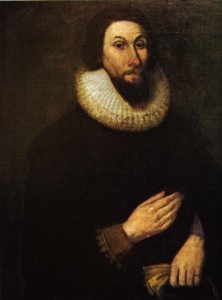 The LA Times sheds additional light on the complex question of America’s founding and the religious ideals of historical figures in this piece. Author John M. Barry described Roger Williams breaking away from the Massachusetts Pilgrims to found Rhode Island, quoting his view of religious liberty:
The LA Times sheds additional light on the complex question of America’s founding and the religious ideals of historical figures in this piece. Author John M. Barry described Roger Williams breaking away from the Massachusetts Pilgrims to found Rhode Island, quoting his view of religious liberty:
[even] “the most Paganish, Jewish, Turkish, or Antichristian consciences and worships” [should be allowed to pray or not pray]
“forced worship stinks in God’s nostrils.”
Williams is notable because he stands in stark contrast to John Winthrop who is the source of the “city upon a hill” that is a common reference point in presidential aspirational speeches:
For we must Consider that we shall be as a City upon a Hill, the eyes of all people are upon us
Yet, for all that shiny exceptionalism, Puritans believed slavery was justified by the Old Testament, harassed and executed Quakers, reviled one another as heretics, and believed that God had killed Native Americans using smallpox to give the land to the Puritans:
But for the natives in these parts, God hath so pursued them, as for 300 miles space the greatest part of them are swept away by smallpox which still continues among them. So as God hath thereby cleared our title to this place, those who remain in these parts, being in all not 50, have put themselves under our protection.
The goal of a GOP candidate using the “hill” quote is to invoke the ghost of Reagan. Sadly, the important historical lessons about tolerance and the evolutionary seeds of our modern understanding of the ethics of freedom get lost when it becomes jingoistic.